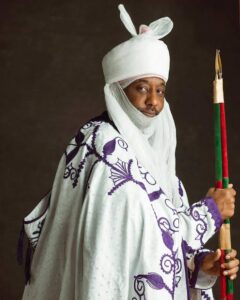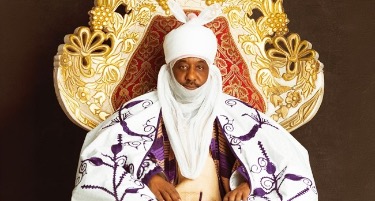In a state already charged with tension over the ongoing Emirship tussle, Kano witnessed an extraordinary day during the Eid el-Kabir celebrations as both the reinstated and the deposed emirs led prayers in separate locations. On Sunday, Emir Muhammad Sanusi II and Governor Abba Kabir Yusuf were compelled by rain to conduct their prayers inside the Kofar Mata Juma’at Mosque. Meanwhile, Emir Aminu Ado Bayero performed the prayers at the Nassarawa Mini Palace Mosque.
Despite the ban on durbar activities previously announced by the Kano State Police Command, Emir Sanusi II proceeded to Gidan Shettima Palace at Kofar Kwaru after the prayers, where he held a mini durbar in open defiance of the prohibition. The ban, according to the police, was a measure to ensure peace and security during the celebrations.
Governor Yusuf, who joined the congregation led by Emir Sanusi II and prayed the two-unit prayers behind him, made an appeal to the people of Kano. He urged them to maintain calm and peace while they carried on with their lawful activities. The governor also addressed the issue of the police-imposed ban on durbar activities, noting that the police had not consulted him before making their decision.

Contrastingly, at the Nassarawa Mini Palace Mosque, Emir Aminu Ado Bayero’s congregation included former commissioner Ahmad Yakasai, who expressed his gratitude for the prevailing peace in the state despite the Emirship dispute. This sentiment highlights the delicate balance being maintained in Kano amidst the contention over the emirate’s leadership.
The presence of Governor Yusuf at the prayers led by Emir Sanusi II could be seen as a significant gesture of support, suggesting a leaning towards reconciliation amidst the leadership crisis. However, the governor’s statement regarding the police ban reflects the complexities and challenges in navigating the situation without further escalating tensions.
Kano’s residents, in the wake of these developments, are left to ponder the future of the emirate. The dual celebrations in different locations not only mark a significant moment in the state’s history but also underscore the ongoing power struggle. Despite the tensions, the day’s events proceeded without any major incidents, a testament to the citizens’ resilience and commitment to peace.
The Eid el-Kabir celebrations, traditionally a time of unity and festivity, have thus taken on a new dimension in Kano. The emirate’s split leadership underscores the broader political and social challenges facing the state. As the dust settles on the day’s events, the hope remains that dialogue and diplomacy will eventually pave the way for a resolution to the Emirship tussle.




